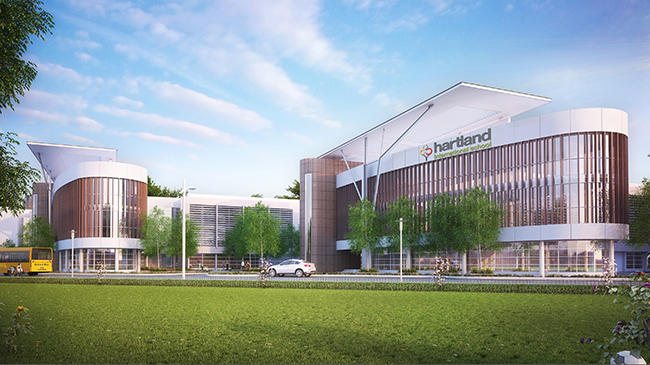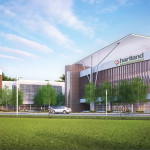First impressions of Hartland International School can probably best be rounded up as “Impressive” and “Isolated”. Located close to the Al Khail and Al Ain roads, the school can be a little difficult to reach, but a turn off by the Quarantine stables at Nad Al Sheba before Meydan leads the way through a vast desert area to the school. Part of the Mohammed bin Rashid development and owned by Sobha, an Indian group active in the Gulf for many years, Hartland International School certainly stands out among the sand and has been surrounded by trees and greenery to good effect. The buildings are white and designed in groups of grassed quadrangles, with the front of the school featuring 3 protruding glass and steel prongs into which the Foundation, Primary and Secondary sections of the school are arranged.
The Sobha Group is committed to education and has shown this both through a charity school that it has operated in India for a number of years and the development of its first education venture in the UAE.
Certainly no expense seems to have been spared in creating a learning environment with the best of facilities and resources. The Foundation and years 1-3 classrooms are located on the ground floor. Classrooms are colourful and corridors are decorated with murals. Furniture is bright and appropriate. Each classroom has access to external play and learning areas and there is also a very large soft play area for use during warmer weather.
One of the highlights of the school is the Junior Library which contains 8,500 books. An Arabian Tower at the centre reminds children of the local culture and during their weekly library period, they are able to enjoy reading, sat on soft, tactile seating, surrounded by curved book cases, which makes this such an attractive environment.
Years 4, 5 and 6 are housed on the first floor of the school and children are divided into tutor groups of approximately 12 children. They meet together with their tutor for 2 registration periods per day, but spend the rest of their time moving from one classroom and lesson to another (as is the usual arrangement in Secondary school), with differentiated learning applied within the groups. Science rooms and IT rooms (offering IT/coding and digital citizenship and Lego mind-storm activity), as well as Food Technology, a Dance studio and Blackbox room, ensure that children are able to participate in a wide range of learning activities, both as part of the core curriculum and also the Enrichment activities that take place for one hour per day, four times per week and which are included in the school fees and timetable. In order to ensure that children receive a well-rounded programme, they are required to select up to 2 sports activities, as well as a creative and an intellectual activity.
Further facilities include a vast Auditorium (which is just awaiting final completion), a canteen serving hot meals that is shared by teachers and children together, a Sports Hall where technology is integrated into the teaching through swipe boards that explain the activity or task to be undertaken, a 25meter swimming pool with touchpad technology and a smaller 90cm deep pool for beginners. In addition to the usual classrooms, there are also a range of specialist rooms for Music, Art and Languages. Music rooms offer a wide range of instruments, as well as a recording studio and music technology suite. Arabic is taught from FS1 and French from year 1. The school will also offer Mandarin, German and Spanish – all taught 3 times per week. Hartland is committed to ensuring that all staff receive the same professional development and support, so that language teaching is integrated into “The Hartland Way”.
And it is “The Hartland Way” that we felt really distinguished this school, beyond the modern buildings and resources.
At its heart are the staff, all of whom are UK trained and at their lead, with both Ms Stephen and not Cottam, an inspirational Principal.
The Hartland Way is a philosophy of teaching and interaction with the children that leads them to become “self-learners”. We were told the school sees its role not so much as to teach children, but rather to give them the skills to be able to learn and to become independent in this learning process.
Classroom assistants are referred to as Learning Assistants to emphasise that this is their role. The curriculum is built as a jigsaw, with each element relating to the next, so that no subject is taught in isolation and without reference to other subjects or topics.
Staff are encouraged to teach through meaning and context and follow the Unit of Enquiry concept common to the IB curriculum, but increasingly being adopted by progressive UK curriculum schools, where the approach is cross-curricular rather than siloed single subject learning. Often the teacher will pose a problem and through this, children will find out about the subject themselves with guidance from staff. This enables children to develop their literacy and communications skills and to develop the art of effective questioning – a pre-cursor to “flipping the classroom”, where students are responsible for researching their topic outside of the classroom and then presenting it wearing the mantle of the expert.
“The Hartland Way” also ensures that children not only receive the academic input from the school, but also grow into responsible individuals with a strong sense of moral value. Every child receives a passport which contains a targeted set of core values and behaviours (as well as academic goals), which students will retain throughout their time at the school. As they show their capabilities and activities to support their achievement of the targets to staff, so they are rewarded through the issue of “visas” in their passport that enable them to benefit from specific benefits.
Hartland International School is also very serious about achieving academic success and communicating with parents to ensure that they, too, are fully involved and committed to their children’s education. Baseline testing and reporting is carried out at the start of the academic year and parents receive a weekly update in relation to progress. Prior to parent-teacher meetings, parents are also asked to complete a questionnaire on their expectations and goals for their children and these are translated into the “hopes and dreams” against which progress is measured alongside the UK SAT (standard testing) programmes. Hartland also organises regular coffee morning and workshops for parents about specific ways in which subjects (such as Maths, Reading, Arabic) are taught and how they can support this at home.
The school places great emphasis on providing value-added academic success to students and supports this through an extensive Gifted and Talented programme for the most able and also strong EAL and SEN resources for the less academically able or for those in need of specific additional support. For children requiring EAL support, they are registered and targeted on a one to one basis with an EAL teacher in place of MFL classes. For children with special educational needs, the schools works with parents (and therapists where required) to provide an integrated and inclusive approach, with the provision of an Individual Education Plan to staff working with each child that provides an overview of the most appropriate learning strategies. The school meets with, and shares policies and practices with both parents and shadow staff.
During our visit to the school, we met a group of parents who had just attended a workshop and were enjoying a refreshment from the coffee shop that is available in the main lobby. They had nothing but enthusiastic comments to make about the school and its staff, many of whom were singled out for their inspirational information sessions.
There is no doubt that concerns have grown since that first inspection, and that the evolution of the school since opening has not been linear or always in the right direct. To some degree this is understandable – new schools will hit bumps on the road, but recent very high profile losses will have been a worry for parents.
A growing number of parent groups have formed to take charge of activities around the school including the establishment of a Library Club, and Parent reading sessions for Foundation children. There is no doubt that Hartland is currently a small school in terms of student numbers, and in some parts, the school is still very empty, but we very much hope those committed parents we saw on our first inspection will help it through its current difficulties. In terms of location, facilities, resources – and the mission and philosophy laid out this is a school that could still be a guiding light for schools in the region.




























![QQ Mens Analog Dress Watch [Q842J402Y]](https://uaemegadeals.com/wp-content/uploads/2016/05/01723-50x50.jpg)
![Casio G-SHOCK Mens Digital watch [GD110-7D]](https://uaemegadeals.com/wp-content/uploads/2016/05/01802-50x50.jpg)





